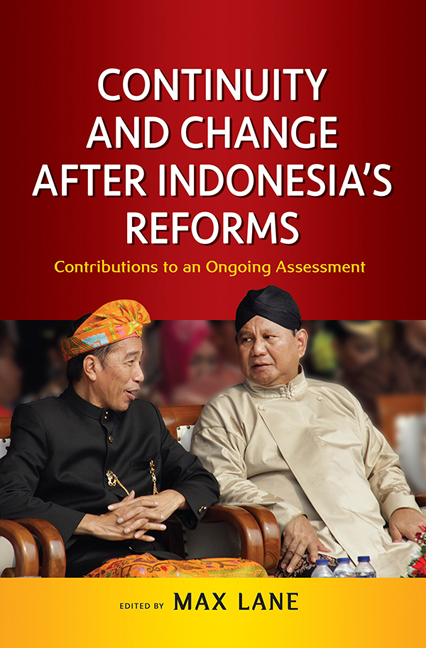Book contents
- Frontmatter
- Contents
- Preface
- About the Contributors
- 1 Indonesia's New Politics: Transaction Without Contestation
- 2 Indonesian Parties Twenty Years On: Personalism and Professionalization amidst Dealignment
- 3 Ideologies of Joko Widodo and Indonesian Political Parties
- 4 Political Islam Movements and Democracy in Indonesia: A Changing Landscape?
- 5 Creating Leadership Legitimacy in Post-Reform Indonesia
- 6 The Political Middle Class in Post-Soeharto Era Indonesia
- 7 The Politics of Centre–Local Relations in Contemporary Indonesia
- 8 The Roots and Actors of Corruption in the Political Realm
- 9 Why Is It Really Hard to Move On? Explaining Indonesia's Limited Foreign Policy Reform After Soeharto
- 10 Papua under the Joko Widodo Presidency
- 11 Youth “Alienation” and New Radical Politics: Shifting Trajectories in Youth Activism
- Index
Preface
Published online by Cambridge University Press: 06 September 2019
- Frontmatter
- Contents
- Preface
- About the Contributors
- 1 Indonesia's New Politics: Transaction Without Contestation
- 2 Indonesian Parties Twenty Years On: Personalism and Professionalization amidst Dealignment
- 3 Ideologies of Joko Widodo and Indonesian Political Parties
- 4 Political Islam Movements and Democracy in Indonesia: A Changing Landscape?
- 5 Creating Leadership Legitimacy in Post-Reform Indonesia
- 6 The Political Middle Class in Post-Soeharto Era Indonesia
- 7 The Politics of Centre–Local Relations in Contemporary Indonesia
- 8 The Roots and Actors of Corruption in the Political Realm
- 9 Why Is It Really Hard to Move On? Explaining Indonesia's Limited Foreign Policy Reform After Soeharto
- 10 Papua under the Joko Widodo Presidency
- 11 Youth “Alienation” and New Radical Politics: Shifting Trajectories in Youth Activism
- Index
Summary
This book is primarily the outcome of a workshop held at the ISEAS – Yusof Ishak Institute, Singapore in March 2018. Thirteen researchers studying contemporary Indonesian politics gathered at the Institute to discuss the extent to which the previous several years had ushered in a “new politics” or whether such a process was indeed evolving. The discussion also involved other researchers from the ISEAS Indonesian Studies Programme acting as discussants to the ideas presented by those who have contributed chapters. As reflected in this volume, the majority of those present were Indonesia-based researchers.
The reason for asking such questions about the extent of political change was that such a discussion was rife among both observers of Indonesian politics as well as actors and participants. In 2014, Joko Widodo, a furniture manufacturer and former mayor of the provincial city of Solo was elected president of Indonesia, defeating Prabowo Subianto, a Soeharto-era general and part of the milieu of conglomerate capital that had been dominant for so long in Indonesia. Was the election of a president from such a different social milieu than that which was seen to be previously dominant a symptom of deeper changes in Indonesian politics? Or was this new development less significant than many thought?
The eleven chapters in this book are a product of the workshop discussion as well as a reflection of the ongoing assessment of the individual authors. The topic is too wide and complex to expect a collection of 11 contributions such as this book to give definitive answers or resolve major issues. Furthermore, the chapters are not meant to reflect a consensual outcome but rather represent 11 individual contributions to a discussion of political developments over the last several years, especially in relation to the issue of the depth and extent of political change. Although with an eye to the question of change versus continuity, these contributions also focus on specific aspects of recent developments. Only the first chapter makes an attempt to give a general picture of developments based on the materials in this book. It is likely that other kinds of summations of this material are also possible.
- Type
- Chapter
- Information
- Continuity and Change after Indonesia's ReformsContributions to an Ongoing Assessment, pp. vii - viiiPublisher: ISEAS–Yusof Ishak InstitutePrint publication year: 2019

